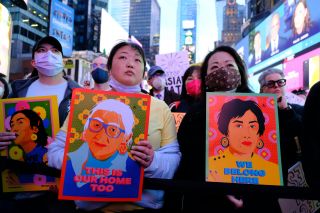Social Media
Protecting Your Mental Health While Navigating Racism Online
Strategies for empowerment and resilience in digital spaces
Posted March 13, 2024 Reviewed by Davia Sills
Key points
- Proactively use platform tools to filter out hate speech and foster a safer online environment.
- Connect with supportive communities to share experiences and seek validation amidst online racism.
- Recognize emotional responses to racist comments and prioritize self-care and mental well-being.
- Advocate for greater representation and inclusion in digital spaces to combat stereotypes and discrimination.

In the digital age, social media platforms have become powerful tools for communication, connection, and advocacy. However, they can also be breeding grounds for hate speech, discrimination, and racism. Dealing with racism online can take a toll on your mental health, but there are strategies you can employ to protect yourself and promote positive dialogue. In this post, we’ll explore some effective ways to handle racism online, drawing from both professional advice and personal experiences.
My Personal Experience
Long story short, I posted a series on social media as part of a green flag trend where friends would auction off their bachelor friends who had “green flags.” The video featured my Chinese friend, who also happens to be a Swiftie, participating in the trend. Given that my TikTok account is niched in Taylor Swift fandom and mental health, it seemed like a perfect combination.
However, what I encountered went beyond the typical responses. Instead, my post was inundated with racist comments, ranging from subtle microaggressions to overt hate speech. Reading through these comments was not only disheartening but also deeply distressing. It felt like a direct attack on my identity and beliefs. Upon reflecting on the trend, I realized the majority of the participants I had seen were Eurocentric men.
As a result, I started to feel unsure of posting any content at all because I was afraid of the hateful responses. I knew I couldn’t face this alone. I reached out to my support system, including close friends and family, who provided invaluable guidance and comfort. Ultimately, I made the difficult decision to no longer engage with the series I posted. While it was an important topic, the toxicity surrounding it outweighed any potential benefits. In order to protect not only my own mental health but also the safety of my friends and followers, I made the choice to take down the posts.
Processing this decision with my support system was instrumental in finding clarity and peace amidst the chaos. While it was disheartening to remove the posts, it was a necessary step in reclaiming control over my online space and preserving my mental health. I realized that haters gonna hate, hate, hate, hate, hate, and I needed to reclaim my voice in a way that felt right for me.
Asian Men and Discrimination: A Historical Perspective
Understanding the discrimination faced by Asian men requires a deeper look into the historical context of racism in the United States. Throughout history, Asian American men have been subjected to various forms of discrimination, ranging from systemic exclusion to harmful stereotypes perpetuated by media and popular culture.
It’s crucial to acknowledge that Asian American women, in addition to Asian men, have been subjected to fetishization and objectification online and in society. Stereotypes and hypersexualized portrayals of Asian women in media and popular culture have perpetuated harmful stereotypes and contributed to their marginalization. The fetishization of Asian women reduces them to mere objects of desire, ignoring their individuality and humanity. It reinforces harmful power dynamics and perpetuates racial stereotypes that can have damaging effects on their mental health and well-being.
In the 19th century, Asian men faced widespread discrimination, particularly during the era of Chinese Exclusion Laws and the exploitation of Asian laborers for projects such as the building of the transcontinental railroad. These laws not only restricted immigration but also fueled xenophobic attitudes towards Asian men, portraying them as perpetual foreigners and economic threats.
During World War II, Asian Americans endured further discrimination and prejudice, particularly those of Japanese descent who were subjected to internment camps. These unjust actions were driven by fear and racism, painting Asian Americans as enemies of the state solely based on their race.
In contemporary times, Asian men continue to face stereotypes and discrimination, often depicted as emasculated or lacking masculinity in Western media. These harmful representations not only perpetuate negative stereotypes but also contribute to the marginalization and dehumanization of Asian men in society. Furthermore, the COVID-19 pandemic has brought to light the pervasive issue of racism, particularly against Asian communities. Hate crimes targeting Asian individuals in major U.S. cities have spiked since 2020. This alarming trend has been fueled by xenophobic rhetoric and misinformation surrounding the origins of the virus.
While progress has undoubtedly been made in challenging stereotypes and combating racism, it’s essential to acknowledge that we still have a long way to go. The landscape of social media and digital platforms has provided avenues for marginalized voices, including Asian men, to speak out against injustice and demand representation. However, despite these advancements, systemic racism and discrimination persist, both online and offline. Recent movements like #StopAsianHate have shed light on the ongoing struggles faced by Asian communities, highlighting the urgent need for collective action and advocacy.
Strategies for Dealing with Racism Online
Now, let’s delve into some effective strategies for navigating these treacherous waters.
1. Recognize Your Emotional Response: When faced with hateful comments online, it’s natural to feel anger, sadness, or frustration. Acknowledge these emotions and give yourself permission to feel them. Suppressing or ignoring your feelings can lead to greater distress in the long run.
2. Take a Step Back: Before responding to the comments, take a moment to step away from the screen. Distance yourself from the situation if you need to, and return at a later time.
3. Seek Support: Reach out to friends, family, or other online communities for support. Sharing your experiences with others who understand can provide validation and comfort. Additionally, consider seeking professional help if you find yourself struggling to cope with the emotional impact of cyberbullying or racial injustices.
4. Set Boundaries: It’s important to establish boundaries for yourself when engaging with content online. This may involve blocking or unfollowing individuals who consistently engage in harmful behavior. You are not obligated to subject yourself to toxic environments.
5. Report and Document: Most social media platforms have policies against hate speech and discrimination. Take advantage of reporting features to flag racist comments and content.
6. Educate When Possible: While it’s not your responsibility to educate others about racism, if you have the emotional bandwidth, consider responding to ignorant comments with factual information or resources. However, prioritize your well-being and disengage if the interaction becomes too draining.
7. Utilize Platform Tools: Many social media platforms offer features that allow users to filter out specific keywords or general hateful content (as deemed by AI). Take advantage of these tools to create a safer online environment for yourself. You can minimize exposure and protect your mental well-being while still engaging with the online community.
By reclaiming your narrative, you can empower yourself and others to combat racism and discrimination online and in society as a whole. Together, we can work towards creating a more inclusive and equitable world for all individuals.
This post was also published at livinglotustherapy.com.
2024 Copyright Living Lotus Therapy.
References
Gover, A. R., Harper, S. B., & Langton, L. (2020). Anti-Asian hate crime during the COVID-19 pandemic: Exploring the reproduction of inequality. American Journal of Criminal Justice, 45(4), 647–667. https://doi.org/10.1007/s12103-020-09545-1




